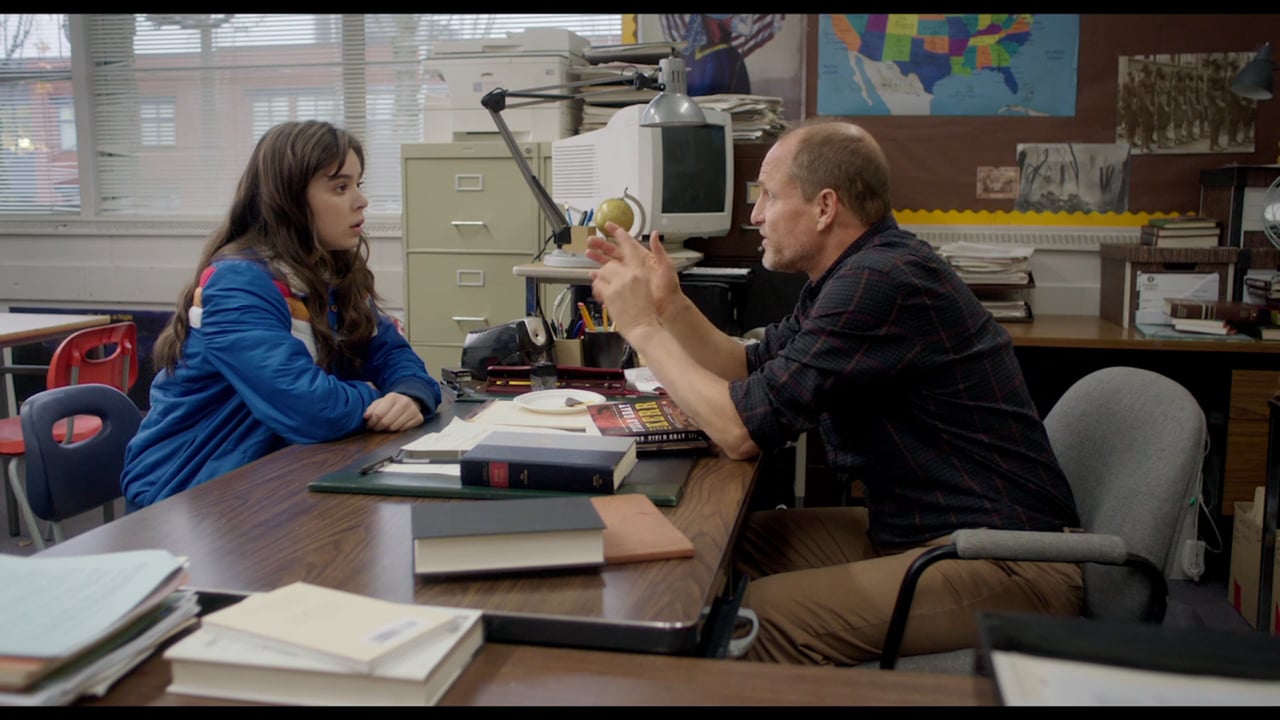As the great philosopher René Descartes once said: “I think, therefore I must be right.”
Directed by Kelly Fremon Craig, The Edge of Seventeen is the story of a self-righteous teenage girl named Nadine, played by Hailee Steinfeld.
Nadine must face reality now that she’s seventeen, her father’s death having come four years prior, the loathsome relationship Nadine has with her mother, and the newly formed relationship between her despised older brother and her lifelong best friend Krista, played by Haley Lu Richardson. Nadine has to come to terms not only with herself, but also with a new reality: reality.
Firstly, I’d like to commend the cinematography of The Edge of Seventeen. Shot by Doug Emmett, what could easily have been a “face-shot film” is technically outstanding.
The lighting for Nick, played by Alexander Calvert, and Nadine’s scenes are crafted so that the lighting on each of their faces is different. It shows this fundamental difference between the two that should be apparent to the audience in sight and in hearing, but not to the characters themselves.
There’s also a truly powerful shot where the camera is focusing like it’s in first-person from the perspective of someone who has been injured, but it turns out that they’re actually dead.
It’s not first person, but simulating the experience of waking up from a bad dream to find out it’s real, gracefully portraying Nadine’s thoughts and feelings. It’s impressive and makes The Edge of Seventeen an extremely watchable film.
Another highlight of this film was this clear parallel between Nadine and her mother, played by Kyra Sedgwick.
Both of their characters are so stubborn and so argumentative that they cannot understand the other’s point of view.
This characteristic that separates them so much is also what connects them, which I found sad, but also truly heartfelt. Just because Nadine is clearly her mother’s daughter, doesn’t mean that she feels like it. It’s a detail that makes their relationship interesting to watch develop, on top of watching how similarly they react to each others actions.
Let me also say, The Edge of Seventeen is funny. It’s really funny.
Hailee Steinfeld’s one-liners back and forth with Woody Harrelson are some of the funniest lines from any movie from 2016 period.
That’s assuming of course that you can handle darker humor that is not only relentless, but unconcerned with any sort of boundary possibly posed by society. So take that recommendation with a grain of salt I guess.
And, on top of that, the “will-they-won’t-they” relationship with Erwin, played by Hayden Szeto, is so tragically funny, that it’s difficult to not see yourself in either part of their relationship from one point or another in your life.
It’s a vicarious humor that really sticks and leaves a warm feeling especially after the immediate end of the film.
Those things being said, I also had a considerable amount of problems with this movie as well. For a film so clearly about the female experience, it was hard not to notice that the female presence was astonishingly absent during the ending.
If you are spoiler sensitive, now would be the time to skip two paragraphs. Her two primary female relationships (her mother and best friend) are reduced to an eventual call and a text message. Neither of these actions are considered before the conclusion of the film by the main character, and what’s more, we see their reactions but not Nadine’s.
Not only does this point reflect that Nadine has been rewarded with the attention she so clearly sought, but doesn’t hold any accountability to her actions.
If I were to apply a feminist critique to this point as well, Nadine’s life relies so heavily on her male influences that by the end, it’s a story celebrating the heroism of men for dealing with women.
Nadine’s father was a “woman-tamer” during his life, her brother fixes the shitty parts of her personality in addition to stealing the only positive female representation from her, and Nadine’s happiness is clearly dependent on her falling in love with Erwin.
At the end of the film, Erwin is the one who opens up avenues for social acceptance and what can be assumed to be eventual happiness. And I don’t think I need to revisit the fact that there is no female presence in any of this happiness. Her mom’s text is a distraction in a movie theater and Krista, her best friend and only friend, is not worth the time to wait and talk to.
The Edge of Seventeen is every joke you were too afraid to make in high school. It’s a film with merit and substantive heft. It’s not necessarily the most well rounded or particularly feminist in its goals. But it’s funny. It’s really funny.
